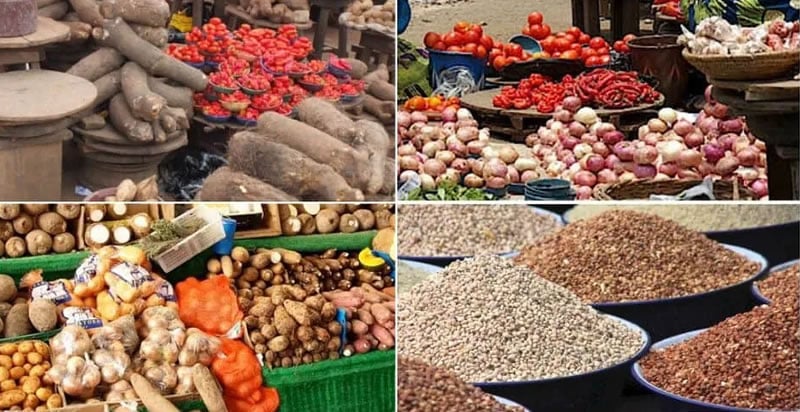Food prices have surged again in major markets across Nigeria as citizens engage in panic buying ahead of the planned nationwide #EndBadGovernance protest.
Despite last-minute efforts by the Federal Government to halt the protest, momentum remains strong among organizers who are determined to proceed.
The protest is fueled by demands for improvements in the soaring cost of living and a reversal of certain government policies, particularly the removal of the petrol subsidy.
The subsidy removal, compounded by ongoing security issues in farming regions, has increased transportation costs and exacerbated food inflation.
In a bid to prevent the demonstration, the Secretary to the Government of the Federation, Senator George Akume, held an emergency press conference on Wednesday, urging Nigerians to refrain from participating.
Other high-ranking officials, including the Minister of Information and National Orientation, Mohammed Idris, and Minister of Budget and Planning, Atiku Bagudu, also called for the suspension of the protest, highlighting the government’s policies aimed at alleviating the economic burden on citizens.
On Wednesday, the Inspector-General of Police, Kayode Egbetokun, convened an urgent press conference, and the National Assembly cut its recess short to address the issue. The Speaker of the House of Representatives, Tajudeen Abbas, appealed to youths in a town hall meeting to engage in dialogue with the government.
Akume acknowledged the right to protest but cautioned against the potential for demonstrations to be hijacked by criminals.
He added, “We, therefore, appeal to Nigerians of whatever persuasion, belief, demography, gender and status to shun calls for protests against hunger by prioritising peace and progress.
“For avoidance of doubt, the government of President Tinubu recognises the right to peaceful protest but circumspection and vigilance should be our watchword.
“The government is wary of the dangers associated with protests that are vulnerable to being hijacked by bandits, insurgents and other criminals. Rather, we request that dialogue should be advanced and we remain open to such.
“Our appeal is that Nigerians should please pursue the path of peace, dialogue and collaboration in addressing the challenges that collectively confront us.”
He emphasized the need for peace and dialogue, stating that President Tinubu’s administration has made significant strides in economic reform and social welfare, including wage increases and educational support.
Amid the government’s pleas, panic buying gripped markets across the country. Prices of essential food items such as rice, beans, yams, and noodles have skyrocketed, with traders attributing the hikes to increased costs at depots and transportation challenges.
“From the news, it appears this protest may not just be another rally. So, I came here to buy food and stock my home for, at least, two weeks. In case the protest goes beyond the stipulated time, my family and I would have something to eat,” Mrs Adeyinka Fakunle told The PUNCH at Balogun Market, Lagos Island, on Wednesday.
In Abuja, prices of foodstuffs have surged dramatically, with a 50kg bag of rice now selling for up to N90,000 and yams costing N7,000 each.
A mudu (local measure of eight cups) of beans, previously sold for between N2,000 and N2,500, now sells for N3,500 while a mudu of garri, previously N1,300, sold between N1,400 and N1,500. A carton of Indomie noodles previously sold at N7,500 has gone up to N7,700 while a basket of Irish potatoes, sold previously at between N5,000 and N5,500, now sells for N6,000 per basket.
A trader, Cynthia Ogu, who sells food items, said, “For instance, I don’t sell eggs in bits anymore. I sell an entire crate, at N4,600. If I sell single, I may sell short. The Indomie (noodles) used to be N7,500. I buy at that amount but I have to make gains somehow, that’s why there is an extra N200. The Super Pack is N17,000 now. And I don’t give a discount; it used to be about N15,000. So, this is why the price is high.”
Similar price hikes were observed in markets in Lagos, Ogun, Kwara, and Ebonyi states, with many residents expressing frustration over their inability to afford basic necessities.
A market research conducted in Ilorin, the Kwara State capital, showed that residents had the intention stocking their homes with foodstuff but lacked the financial capacity.
“I was given N13,000 by my husband to buy guinea corn and yam for our family, but what I met in the market is shocking, six tubers of small yam were sold for N10,000 while a tin of guinea corn costs N3,500. The amount of food I bought for our family of 11 with the money I had cannot last more than three days”, a housewife, Musilimatu Onikoko, lamented
In Lagos, The PUNCH reports that markets were unusually crowded with buyers, who were afraid the protest might linger and hinder them from buying fresh supplies.
Some traders at the popular Iyana-Iba market on Wednesday said a large number of their customers had been buying foodstuffs in preparation for today’s protest.
A trader, who sells spaghetti, seasonings and other packed foodstuffs, Mrs Ngozi Okezie, said, “I have had customers from morning and they told me they wanted to have food at home before the protest began.”
During a visit to Kpeti market in Tai Local Government Area of Rivers State, residents bought food items in large quantities amid security presence, which a seller at the market, who identified herself simply as Madam Beauty, described as “unusual.”
“We used to have just few policemen at the entrance to the market but today (Wednesday) there were lots of soldiers, so many of them,” she added.















Comments are closed